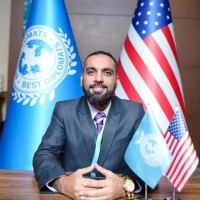What Recommendations Do Public Relations Specialists Have for Managing Media Relations at High-Profile Events?
Managing media relations during a high-profile event can either make or break your organization's public image. That's why insights from a Public Relations and Content Marketing Specialist and a Founder & CEO are invaluable. This article begins by exploring the importance of creating a comprehensive media plan and concludes with expert advice on setting up a centralized communication hub, bringing you a total of eight essential insights. Read on to equip yourself with the expert strategies you need to navigate the media landscape with confidence.
- Create a Comprehensive Media Plan
- Anticipate Challenging Questions
- Establish a Proactive Communication Plan
- Identify Core Messages
- Appoint a Designated Spokesperson
- Designate a Dedicated Media Liaison
- Prepare an Elaborate Media Kit
- Set Up a Centralized Communication Hub
Create a Comprehensive Media Plan
To ensure successful media relations during a high-profile event, it's essential to create a comprehensive plan with a clear timeline, designated spokespeople, and tailored messages. Direct media inquiries to a central point of contact; prepare a media kit with press releases, fact sheets, bios, and high-quality images; schedule media briefings or interviews; and maintain open communication with journalists. It will help shape public perception and ensure smooth communication, fostering positive relationships and encouraging future coverage.

Anticipate Challenging Questions
One key recommendation is to anticipate challenging questions before the event. By thinking ahead about what tough inquiries might arise and preparing thoughtful responses, you can handle media interactions with confidence.
This proactive approach not only demonstrates professionalism but also helps prevent miscommunication, ensuring that your key messages are conveyed effectively.

Establish a Proactive Communication Plan
One key recommendation for effectively managing media relations during a high-profile event is to establish a clear, proactive communication plan ahead of time. This plan should include a detailed schedule of events, key messages, spokesperson guidelines, and a list of designated media contacts. Having a well-structured plan allows your team to be prepared for any inquiries or situations that may arise, ensuring consistent messaging and timely responses.
Additionally, consider hosting a media briefing prior to the event to familiarize journalists with the agenda, key figures involved, and any significant announcements. This not only builds relationships with the media, but also provides an opportunity to clarify expectations regarding coverage. During the event, ensure that a dedicated media liaison is available to assist journalists, facilitate interviews, and address any issues. This proactive approach fosters positive relationships with the media and enhances the overall coverage of your event.

Identify Core Messages
Establishing a comprehensive media relations strategy before a high-profile event is vital for enhancing visibility and shaping public perception in affiliate marketing. Key steps include identifying core messages that align with your marketing strategy, resonate with your audience, and preparing effective engagement with journalists and influencers. This proactive approach helps safeguard brand reputation and effectively communicate the event's value to stakeholders.

Appoint a Designated Spokesperson
For effective media management during a high-profile event, appointing a designated spokesperson is crucial. This individual should be thoroughly informed about the event's details and capable of addressing media questions and inquiries with ease.
In my experience, I had a client who was hosting an open house for a luxury property. The property garnered a lot of attention from local media outlets, and we knew it was important to manage their coverage carefully. We designated one of our team members as the spokesperson, and they were responsible for communicating with the media before, during, and after the event.
Having a designated spokesperson helped us stay organized and on top of all media inquiries. They were able to provide consistent messaging and ensure that all information shared with the media was accurate. This helped us maintain a positive image for our client and the property.

Designate a Dedicated Media Liaison
Designate a dedicated media liaison. This person acts as the main point of contact for all media inquiries, ensuring that responses are prompt, consistent, and accurate. By having someone focused solely on media interactions, you can maintain clear and organized communication, quickly address any issues that arise, and build strong relationships with journalists. This approach helps control the narrative around your event and ensures that your messaging remains cohesive and professional throughout the entire experience.

Prepare an Elaborate Media Kit
Hi,
I'm Fawad Langah, a Director General at Best Diplomats organization specializing in leadership, business, global affairs, and international relations. With years of experience writing on these topics, I can provide valuable insights to help navigate complex issues with clarity and confidence.
Here is my answer:
However, when it comes to the guidelines for handling media relations, one important recommendation is that an elaborate media kit be prepared. It is a useful tool for journalists and optimizes the image flow.
First, write an unadorned press release covering all the details of the event's purpose, special guests and speakers, and the most important statements. Make sure the basic needs are effectively communicated to the audience, stressing why the event is important. Detail your organization by giving brief background information, such as where it operates from and its mission and achievements. This context enables the reporters to appreciate your organization's relevance, thus creating credibility.
Besides, these include high-quality photo images and graphics that journalists can use while preparing their articles. Another point is the active use of visual materials, as attention is an indispensable tool and the need to make the event memorable.
Assign a media coordination volunteer who will be constantly contactable throughout the occasion. This person should know the topic inside and out and must be proficient in English to answer extra questions or provide further explanations.
Last but not least, do not be passive when using the media during the event. Promote the conduct of interviews and organize meetings with speakers. It helps to build good relations and ensure that the expected tide is on the side of the press.
Media management is crucial, and you should ensure that your organization is prepared regarding media relations during such an event. A media kit that has been prepared in advance would be handy.
I hope my response proves helpful! Feel free to reach out if you have any questions or need additional insights. And, of course, feel free to adjust my answer to suit your style and tone.
Best regards,
Fawad Langah
My Website: https://bestdiplomats.org/
Email: fawad.langah@bestdiplomats.org

Set Up a Centralized Communication Hub
One recommendation for managing media relations during a high-profile event is to set up a centralized communication hub and appoint a dedicated spokesperson. This keeps your messaging consistent and helps prevent any misinformation. The spokesperson should be well-prepared with talking points, FAQs, and ready answers for tough questions.
It's also important to engage the media proactively—provide press kits, real-time updates, and access to key people involved in the event. Building good relationships with the press by being responsive and transparent goes a long way in ensuring your story gets represented the way you want.
Lastly, keep a close eye on media coverage and quickly, but professionally, address any inaccuracies. Managing the flow of information in an organized way helps protect your brand's reputation and ensures you stay in control of the narrative.


